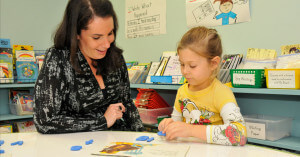 What a developmental specialist does in a school environment varies greatly depending on the needs of the student population and the staff of a school. These needs include everything from age to grade level of the student to the number of students in a classroom and the student-teacher ratios. Within all of these factors and ranges, however, developmental specialists in any school environment will work with children in specific subject areas.
What a developmental specialist does in a school environment varies greatly depending on the needs of the student population and the staff of a school. These needs include everything from age to grade level of the student to the number of students in a classroom and the student-teacher ratios. Within all of these factors and ranges, however, developmental specialists in any school environment will work with children in specific subject areas.
Reading Specialists
Many children of all ages struggle with reading, and developmental specialists in reading programs throughout elementary schools will focus on boosting a child’s confidence in reading as well as for helping to build the skills required to become a more advanced reader. These sessions often take place in small groups or individually with a student. Some common techniques that a developmental specialist might incorporate include singing songs, practicing the alphabet, using words to build other words, and word games that are fun and encourage children to build larger vocabularies and to enjoy reading. At secondary levels, developmental specialists often continue the same type of work, preparing students for the types of reading required in the workplace and at the collegiate level.
Mathematics Specialists
Math is another subject area where many students might struggle. A developmental specialist might also employ similar techniques as in reading to help students gain more understanding of math. This particular field also typically involves a developmental specialist organizing and working with students in tutoring sessions, both in groups as well as with one student at a time. Mathematics specialists might also work with staff to develop programs and lessons to help students learn. Additional information on specific subject areas for developmental specialists, including in math, can be found at the National Association for Developmental Education website.
Behavioral Specialists
One area that many children of all ages need support in is in behavior. A developmental specialist might be mostly concerned with children who have another condition or challenge to overcome in terms of assisting with changes in and monitoring of behavior. However, developmental specialists are placed in roles to supervise and manage disciplinary referrals throughout entire schools. A developmental specialist can be particularly helpful in this area with skill and expertise in fields such as negotiation, behavior modification, and social issues contributing to acting out. Developmental professionals often recommend various programs and other outlets such as counseling for students who are diagnosed with a condition or disorder that increases or exacerbates behavioral issues as well.
Physical and Cognitive Specialists
A developmental specialist can also be an asset for students who have difficulty with processes that involve fine motor skills or general comprehension. Working with various tools such as tweezers, a specialist might be able to help a student who has difficulty holding a pencil, for example. Comprehension is sometimes improved by playing games like checkers and memory games, so a developmental specialist will spend time one-on-one with students.
Related Resource: Speech Therapist Roles In a School
In most cases, schools at the elementary through secondary levels, including early childhood development centers, have a variety of needs in order to best help students succeed. The majority of professionals will incorporate each of these areas and more into the daily tasks of what a developmental specialist does in a school environment each day.



